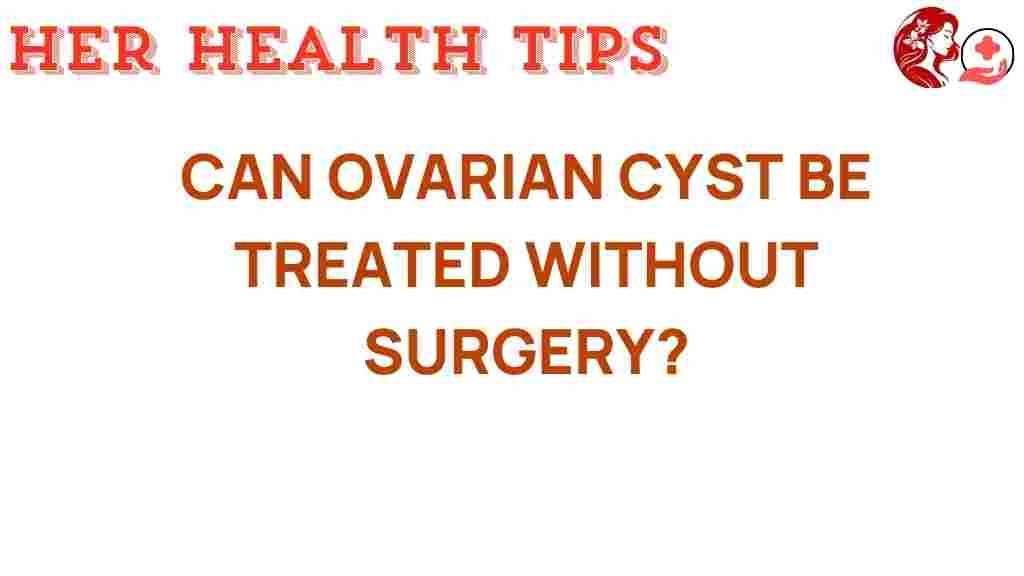Unveiling the Secrets: Can Ovarian Cysts Be Treated Without Surgery?
Ovarian cysts are fluid-filled sacs that develop on the ovaries and are a common concern for many women. Often discovered during routine pelvic exams or ultrasounds, they can cause a variety of symptoms, including abdominal pain, bloating, and irregular menstrual cycles. While surgery is a well-known treatment option for ovarian cysts, many women seek alternatives that do not involve invasive procedures. In this article, we will explore the various treatment options, focusing on non-surgical methods, holistic approaches, and the latest advancements in women’s health.
Understanding Ovarian Cysts
Before diving into treatment options, it’s important to understand what ovarian cysts are. These cysts can be classified into several types:
- Functional Cysts: The most common type, these include follicular cysts and corpus luteum cysts, which typically resolve on their own.
- Dermoid Cysts: These are composed of various types of body tissues, including hair and skin.
- Endometriomas: Associated with endometriosis, these cysts form when endometrial tissue attaches to the ovary.
- Cystadenomas: These develop from the cells on the outer surface of the ovary and can be filled with watery or mucous fluid.
While most ovarian cysts are benign and asymptomatic, some may require treatment if they lead to significant discomfort or complications.
Exploring Treatment Options for Ovarian Cysts
When it comes to ovarian cysts, treatment options can vary based on factors such as the type of cyst, symptoms, and a woman’s overall health. Below, we will discuss several non-surgical methods, holistic approaches, and lifestyle changes that can aid in managing and treating ovarian cysts effectively.
Non-Surgical Methods
Many women prefer to explore non-surgical methods for treating ovarian cysts. Here are some popular options:
- Watchful Waiting: In many cases, doctors may recommend a wait-and-see approach, especially for functional cysts that often resolve on their own.
- Hormonal Birth Control: Hormonal contraceptives can help regulate menstrual cycles and reduce the risk of new cyst formation.
- Medications for Pain Relief: Over-the-counter pain relievers such as ibuprofen or acetaminophen can help manage discomfort associated with ovarian cysts.
- Alternative Therapies: Acupuncture and herbal remedies may provide symptom relief for some women.
Holistic Approaches to Women’s Health
Embracing a holistic approach can be beneficial in managing ovarian cysts. Here are some strategies:
- Dietary Changes: Consuming a balanced diet rich in fruits, vegetables, whole grains, and healthy fats can support hormonal balance.
- Stress Management: Practices such as yoga, meditation, and deep-breathing exercises can help reduce stress, which is linked to hormonal imbalances.
- Regular Exercise: Engaging in moderate exercise can help maintain a healthy weight and regulate hormones.
- Hydration: Drinking plenty of water is essential for overall health and can help in reducing bloating.
Medical Advancements in Ovarian Cyst Treatment
Recent medical advancements have paved the way for innovative treatments that can aid in managing ovarian cysts without the need for surgery. These include:
- Laparoscopy: While minimally invasive, it’s worth noting that this surgical option can be performed with a smaller incision, leading to quicker recovery.
- Ultrasound-guided Aspiration: In some cases, cysts can be drained using ultrasound guidance, reducing the need for open surgery.
- New Medications: Research is ongoing into new hormonal therapies that may reduce the incidence of cysts or help manage their symptoms.
For more information on the latest advancements in women’s health, you can visit WomensHealth.gov.
Step-by-Step Process for Managing Ovarian Cysts
Managing ovarian cysts effectively often requires a multi-faceted approach. Here’s a step-by-step process:
Step 1: Consult a Healthcare Provider
The first step involves consulting a healthcare provider to determine the type and severity of the cyst. A pelvic exam, ultrasound, or other imaging tests may be necessary.
Step 2: Discuss Treatment Options
Based on the diagnosis, discuss available treatment options with your provider. Consider non-surgical methods, including:
- Observation
- Hormonal birth control
- Pain relief medications
Step 3: Implement Lifestyle Changes
Incorporate lifestyle changes to support your overall health. Focus on:
- A balanced diet
- Regular physical activity
- Stress management techniques
Step 4: Monitor Symptoms
Keep track of any symptoms you experience and communicate them with your healthcare provider. Regular follow-up appointments may be necessary to monitor the cysts.
Troubleshooting Tips for Managing Ovarian Cysts
While managing ovarian cysts, you may encounter challenges. Here are some troubleshooting tips:
- Pain Management: If over-the-counter pain relievers are ineffective, consult your doctor about prescription options.
- Persistent Symptoms: If symptoms worsen, seek medical attention promptly to rule out complications.
- Emotional Support: Consider joining support groups or therapy to cope with the emotional aspects of dealing with ovarian cysts.
Conclusion
Managing ovarian cysts without surgery is possible through various treatment options that prioritize non-invasive methods, holistic approaches, and lifestyle changes. While surgery may be necessary in some cases, many women find relief through careful monitoring, hormonal treatments, and lifestyle adjustments. The key is to stay informed and work closely with healthcare providers to tailor a treatment plan that best suits your needs.
Remember, every woman’s journey with ovarian cysts is unique, and finding the right balance of techniques can lead to better management and improved overall health. By embracing a holistic approach and staying updated on medical advancements, you can take control of your health and well-being.
For more resources and information on women’s health, check out WomensHealth.gov.
This article is in the category Reproductive and created by HerHealthTips Team
